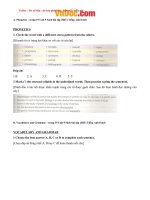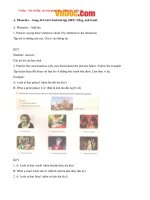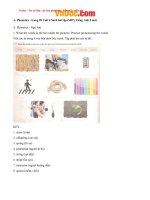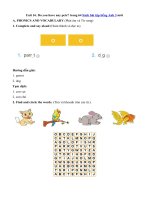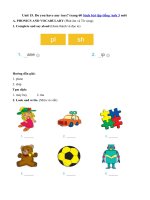Tải Giải bài tập SBT Tiếng Anh lớp 11 chương trình mới Unit 7: Further education - Lời giải sách bài tập Tiếng Anh lớp 11 Unit 7
Bạn đang xem bản rút gọn của tài liệu. Xem và tải ngay bản đầy đủ của tài liệu tại đây (149.19 KB, 9 trang )
<span class='text_page_counter'>(1)</span><div class='page_container' data-page=1>
Pronunciation - trang 11 Unit 7 Sách Bài Tập (SBT) Tiếng anh 11 mới
<b>1. Practise asking the following questions. Mark (rising intonation) or (falling intonation) of the</b>
<b>questions.</b>
<b>Thực hành hỏi những câu hỏi sau đây. Đánh dấu (tăng ngữ điệu) hoặc (giảm ngữ điệu) của các</b>
<b>câu hỏi.</b>
1. Why do Vietnamese students often decide to study abroad?
2. What do Vietnamese students miss most about home when studying abroad?
3. How can we make friends with international students?
4. Did you make friends with the international students?
5. What do international students like best about studying in Viet Nam?
Đáp án:
<b>2. Practise reading aloud the following questions with appropriate intonation.</b>
<b>Thực hành đọc to những câu sau với ngữ điệu thích hợp.</b>
1. Have you ever attended a professional course?
2. What are your reasons for taking a gap year?
3. Do you think Singapore is a safe place to study?
4. How many professional courses does this college provide?
5. When should international students apply for scholarships?
Đáp án:
<b>Vocabulary & Grammar - trang 11 Unit 7 Sách Bài Tập (SBT) Tiếng anh 11 mới</b>
<b>1. Complete the following crossword puzzle.</b>
Giải câu đố ô chữ dưới đây.
Across
1. a specific ability to do something
2. a student who is undertaking a college or university programme to get a first degree
3. a pass of an examination or successful completion of a course
Down
4. relating to a job that needs special education and training
</div>
<span class='text_page_counter'>(2)</span><div class='page_container' data-page=2>
6. related to studying at college or university, as opposed to practical work
Đáp án:
<b>2 Use the words from the crossword puzzle to complete the sentences. Change the word form, if</b>
<b>necessary.</b>
<b>Sử dụng các từ từ câu đố ô chữ để hoàn thành câu. Thay đổi mẫu từ, nếu cần.</b>
1. One of the reasons for Vietnamese students' studying abroad is the quality of the ________ programmes in higher
education.
2. Most of these students are interested in pursuing________ studies for bachelor's degrees.
3. Some students decide to study in the United States or the United Kingdom to improve their language________ , which
can help them to get a better job.
</div>
<span class='text_page_counter'>(3)</span><div class='page_container' data-page=3>
5. The higher education ________ gained at UK universities and colleges are recognised worldwide.
6. Universities must better prepare students for their ________ careers.
Đáp án:
1 academic
2. undergraduate
3.skills
4. scholarships
5. qualifications
6. professional
<b>3 In each sentence there is one verb which is in the wrong tense. Find the mistake and correct</b>
<b>it. Write the correct sentence in the blank.</b>
<b>Trong mỗi câu có một động từ đang ở thì sai. Tìm lỗi và sửa lỗi. Viết câu đúng trong chỗ trống.</b>
1. I have been applying for a vocational scholarship three times.
2. We have just been attending a seminar on further education.
3. How long have the two international students been knowing each other?
4. I started the course two weeks ago, but I have already been passing most of the tests.
5. The academic year has just started and I have lived in the halls of residence so far.
Đáp án:
1. I have applied for a vocational scholarship three times.
2. We have just attended a seminar on further education.
3. How long have the two international students known each other?
4. I started the course two weeks ago, but I have already passed most of the tests.
5. The academic year has just started and I have been living in the halls of residence so far.
<b>4. Complete the following sentences with the present perfect or present perfect continuous.</b>
<b>Hồn thành các câu dưới đây với thì hiện tại hồn thành hoặc thì hiện tại hồn thành tiếp diễn</b>
1. A: Can I have a look at the glossary of study terms?
B: Just a minute. I ... (read) it myself.
2. A: Let's go to the meeting with the international students this weekend.
B: I'd love to, but I ... (not finish) my assignment yet.
3. A: You look so happy! What's up?
</div>
<span class='text_page_counter'>(4)</span><div class='page_container' data-page=4>
B: I ... (search) for information about higher education all morning.
5. A: Your room is in a mess! ... (look) for something?
B: My wallet. I think I ... (lose) it somewhere.
Đáp án:
1. have been reading
2.have not finished
3. have received
4.have been searching
5.Have you been looking; have lost
<b>5 Rewrite the sentences, using the words given and the present perfect or present perfect</b>
<b>continuous.</b>
<b>Viết lại các câu, sử dụng các từ đã cho và thì hiện tại hồn thành hoặc thì hiện tại hồn thành tiếp</b>
<b>diễn</b>
1. Nam's still studying English. He started studying it two years ago. (for)
2. He attended two online vocational courses: one in 2012 and the other in 2013. (twice)
3. The British Council established IELTS a long time ago. It still uses this test as an international standardised test of
English for non-native English language speakers, (for)
4. The university started building a new campus in May. They are still building it. (since)
5. Mary is staying at a homestay during her undergraduate programme. The programme began three weeks ago. (for)
Hướng dẫn đáp án:
1. Nam has been studying English for two years.
2. He has attended online vocational courses twice.
3. The British Council has been using IELTS as an international standardised test of English for non-native English
language speakers for a long time.
4. The university has been building a new campus since May.
5. Mary has been staying at a homestay for three weeks during her undergraduate programme.
<b>Reading - trang 13 Unit 7 Sách Bài Tập (SBT) Tiếng anh 11 mới</b>
<b>1 Read the following text about the Australian education system and fill each gap with a word</b>
<b>from the box.</b>
<b>Đọc văn bản sau đây về hệ thống giáo dục của Úc và điền vào mỗi khoảng cách với một từ từ hộp.</b>
</div>
<span class='text_page_counter'>(5)</span><div class='page_container' data-page=5>
Australia's school education is 13 years, including primary school, (1)_______ school, and senior
secondary school.
Primary school: 7-8 years from Kindergarten to Year 6 or 7 Secondary school: 3-4 years, Years 7 to 10
or 8 to 10 Senior secondary school: 2 years, Years 11 and 12 After completing senior secondary school,
students can choose to pursue (2)_______ education which is generally divided into higher education
and vocational education and training.
Higher education courses are mainly offered by 43 universities in Australia - 40 public universities, two
international universities, and one (3) _______ university. Most of them rank highly for quality of
education and student satisfaction. Among these are 15 universities ranked in the top 100 in the latest
Times Higher Education ranking results (2014).
There are three main types of higher education, which provides students with bachelor's, master's, and
doctoral degrees in a wide range of courses in both natural and (4) _______ sciences. Higher education
qualifications include:
Most of the programmes are (5)_______ , allowing students to enrol in a double degree programme, and
obtain two bachelor's degrees. Vocational courses which lead to Australian Vocational Education and
Training (VET) qualifications offer opportunities for (6)_______ work to students who prefer to focus
on finding a job. These courses are taught by experienced teaching staff and experts to ensure all
students are prepared for the workforce.
Đáp án:
1.. secondary 2. further 3. private
4.social 5. flexible 6. practical
<b>2 Based on the information in the text, complete the following sentences with no more than five</b>
<b>words.</b>
<b>Dựa trên thơng tin trong văn bản, hãy hồn thành các câu sau đây với không quá năm từ.</b>
1. In Australia, school education is divided into three levels:_______
2. In further education, students can pursue _______
3. Australian universities can be categorised as_______
</div>
<span class='text_page_counter'>(6)</span><div class='page_container' data-page=6>
Đáp án:
1. <b> primary, secondary, and senior secondary</b>
2. higher education or vocational education and training
3. public, international, and private
4. obtain two bachelor's degrees
5. by experienced teachers and experts
<b>3. Based on the information in the text, decide whether the following statements are true (T), false</b>
<b>(F), or not given (NG). Tick the boxes.</b>
<b>Dựa trên thông tin trong văn bản, hãy quyết định xem các câu sau đây là đúng (T), sai (F), hay</b>
<b>không xác định (NG). Đánh dấu các ô.</b>
1. Primary school is 7 years starting from Grade 1 for six-year- old children.
2. Secondary school leavers can only pursue higher education after completing a vocational programme.
3. There are 43 Australian universities on the top 100 list of international private universities.
4. Students must have a Graduate Certificate to qualify for a bachelor's degree programme.
5. Students with master's degrees have to study three years or more to get a doctoral degree.
6. Young people with VET qualifications find jobs immediately after graduation.
Đáp án:
1.NG 2. F 3. F
4, F 5.T 6.NG
<b>Speaking - trang 14 Unit 7 Sách bài tập (SBT) Tiếng anh 11 mới</b>
<b>1. Andy and Thu are discussing their preferences for different further education pathways. Put</b>
<b>the lines ir their conversation in order.</b>
<b>Andy và Thu đang thảo luận về sở thích của họ cho những con đường giáo dục khác nhau. Đặt các</b>
<b>dòng trong cuộc trò chuyện của họ theo thứ tự.</b>
(a)Andy: But it will cost a lot of money. Why do we have to live away from home when we have the
Internet? We can save the money for a research or a second degree.
(b) Thu: Cloud learning is really convenient if you want to study from your home or office, but I'd like
to experience campus life. I believe that face-to-face teaching and learning will bring the best results. I
can also make a lot of friends and meet international students.
</div>
<span class='text_page_counter'>(7)</span><div class='page_container' data-page=7>
(d) Thu: Getting a master's degree or a PhD will be worth it, but I'd rather pursue a postgraduate degree
after gaining some working experience. Then I will have some practical skills. Education is a lifelong
process; we don't need to rush through college or graduate school.
(e) Andy: Have you seen this website, Thu? I think I have found a higher education programme at a Viet
Nam's university that will best suit me. All the courses are cloud-based.
(f) Thu: Working and studying for a degree can be very demanding, Andy! But it's your own choice and
you seem determined. The most important thing is to keep learning and developing your skills
1. ...2. ...3. ... 4. ...5... 6...
<b>Practise the conversation with a partner.</b>
<b>Thực hành cuộc hội thoại với một người bạn.</b>
Đáp án:
1.e 2. b 3. a 4, d 5.c 6.f
<b>2. Work in pairs. Make a similar conversation about your preferences for higher education. Use</b>
<b>the model in 1, the information below, and your own reasons.</b>
<b>Làm việc theo cặp. Thực hiện một cuộc trò chuyện tương tự về sở thích của bạn cho giáo dục đại</b>
<b>học. Sử dụng mơ hình trong 1, các thơng tin dưới đây, và lý do của riêng bạn.</b>
Study level undergraduate/ postgraduate/ research candidate
Applicant type secondary school leavers/ mature age (21 or over)
Residency local students/ international students
Attendance mode campus/ distance (e-learning/ cloud-based)
Study mode full-time/ part-time (fewer than 3 credit points per semester)
<b>Writing - trang 15 Unit 7 Sách Bài Tập (SBT) Tiếng anh 11 mới</b>
<b>1. You want to ask your study-abroad adviser for information. Write sentences, using the words</b>
<b>and phrases given.</b>
<b>Bạn muốn hỏi chuyên gia tư vấn du học của bạn để biết thông tin. Viết câu, sử dụng các từ và cụm</b>
<b>từ được đưa ra.</b>
1. would like/ know/ eligible/ apply/ university programme/.
2. you/ explain/ types of funding/ available/ international students/ ?
3. international students/ allowed/ work/ part-time/
4. I/ like/ consult/ you/ cultural differences/ I/ should/ aware/.
</div>
<span class='text_page_counter'>(8)</span><div class='page_container' data-page=8>
Gợi ý đáp án:
1. I would like to know if I am eligible to apply for the university programme.
2. Can you explain what types of funding are available for international students?
3. Are international students allowed to work part-time?
4. I'd like to consult you about the cultural differences (that) I should be aware of.
5. What worries me most is the high cost of living in London as an international student.
<b>2. Choose two of the following questions about preparing for further education. Complete the</b>
<b>outline and write an email of 160-180 words to a friend from another country asking for</b>
<b>information and advice.</b>
<b>Chọn hai trong số những câu hỏi sau đây về chuẩn bị cho việc học thêm. Hoàn thành dàn ý và viết</b>
<b>email từ 160-180 từ cho một người bạn từ quốc gia khác yêu cầu thông tin và lời khuyên.</b>
<b>Questions to ask</b>
Should I take a gap year or pursue further education immediately?
What kind of attendance mode should I choose?
Would it be better to gain some work experience before enrolling on a higher education programme?
Should I study abroad? Why? How should I plan for it?
How early can I apply for a higher education scholarship?
Do I have to take the IELTS test before sending my application form to UK's universities? Will
vocational courses improve my future job prospects?
What is the highest level in vocational education and training that I can achieve?
What qualifications will I get?
<b>OUTLINE</b>
Salutation Opening sentence
Body
First question
Second question
Friendly ending Complimentary close
Gợi ý đáp án:
<b> Dear Maria,</b>
I am writing to ask you for some information and advice on further education.
</div>
<span class='text_page_counter'>(9)</span><div class='page_container' data-page=9>
First, I want to consult you about the advantages and disadvantages of taking a gap year. I know that a
lot of school leavers in your country prefer taking a gap year before deciding to pursue further
education. Would a gap year look good on my college application?
If I pursue further education immediately, what kind of attendance mode should I choose? There are
excellent universities in your country, and a bachelor's degree from one of them will definitely help me
to find a good job easily. However, the tuition fees and living expenses will be very high, and I am not
sure if a scholarship will cover all the costs. Do distance learning degrees offer the same content as
campus-based degrees?
I am looking forward to hearing from you soon.
Regards,
</div>
<!--links-->


